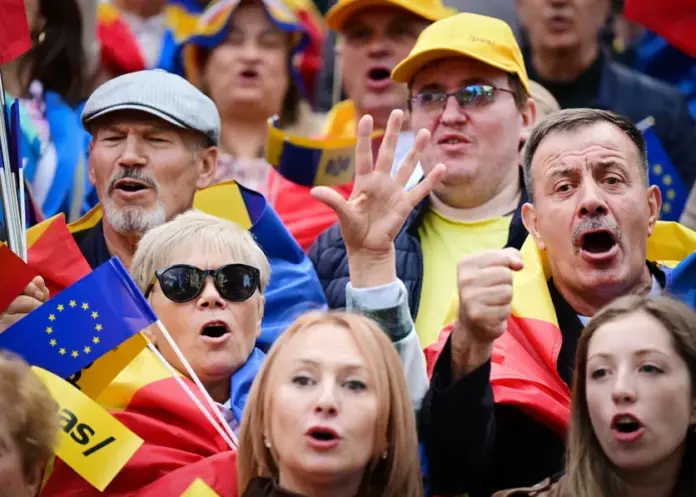Moldovan Parliamentary Elections 2025: The pro-European PAS party claims victory with over 50% of the vote, in a climate of Russian interference, Western propaganda, and unresolved internal fractures.
A Fragile Victory in a Country Under Permanent Pressure
Preliminary results from the Moldovan parliamentary elections, with 99.52% of ballots counted, create the illusion of a massive endorsement of the European project. The ruling Action and Solidarity Party (PAS), led by President Maia Sandu and openly aligned with Brussels and Washington, secured 50.03% of the vote.
Its main opposition, the pro-Russian Patriotic Bloc led by former President Igor Dodon, garnered 24.26%, in an electoral context marred by mutual accusations of manipulation, fraud, and intimidation. With a turnout of around 52%, the numbers reflect a fractured society, distrustful and largely excluded from meaningful democratic debate by overlapping disinformation campaigns.
An Election Under Influence: Between Brussels and Moscow
Moldovan authorities, amplified by Western media channels, blamed a “unprecedented disinformation campaign” allegedly orchestrated by Russia. It’s a now-familiar refrain in post-Soviet republics seeking EU integration—one Moscow swiftly denied.
Maia Sandu, positioned as the pro-European figurehead, accused the Kremlin of spending “hundreds of millions of euros” to buy votes and incite violence, without providing concrete evidence. Meanwhile, opposition allegations of fraud by the PAS were conveniently dismissed by European observers.
Moldova: A Testing Ground for Hybrid Warfare
Beyond the numbers, the real issue in these Moldovan parliamentary elections lies in the structural power struggle between foreign spheres of influence. This small country of 2.4 million, bordering war-torn Ukraine, has become a laboratory for hybrid warfare tactics: electoral disruption, cyber-attacks, economic interference, media suppression, pressure on the diaspora—the full spectrum.
The Moldovan cybersecurity service announced that it had neutralized several hacking attempts targeting the electoral infrastructure—an implicit admission of the fragile state of Moldovan democracy. In such a context, it’s difficult to speak of “free and fair elections,” especially when Western media outlets celebrated the results even before polls closed.
A Latent Russian Military Threat?
The dominant narrative around interference cannot conceal a darker hypothesis—one beginning to echo among analysts: the possibility of a latent armed conflict. As a NATO outsider and geopolitical buffer zone, Moldova is increasingly vulnerable. Should the EU integration process accelerate, Moscow may choose to act. The longstanding Russian military presence in Transnistria remains a very real lever—an operational outpost that could be activated if strategic red lines are crossed.
An Unstable Majority, Prolonged Tensions
Despite this numerical win, even pro-government analysts acknowledge the difficulty of forming a functional administration. Andrei Curararu from the WatchDog think tank described the majority as “fragile,” warning of possible Russian attempts to bribe MPs or incite protests to weaken the government.
On the other side, former President Dodon called for “peaceful protests” in front of Parliament to “defend the citizens’ vote.” A cautious phrasing, but one that could quickly escalate, especially if pro-Russian regions like Transnistria or Gagauzia continue to feel marginalized by central authorities.
The Weight of the Diaspora and the European Trap
The Moldovan diaspora played a decisive role—again. Heavily leaned upon by PAS strategists, the diaspora was crucial in re-electing Sandu in 2024. Yet these voters, often disconnected from internal social realities, overwhelmingly favor EU integration based on idealized projections far removed from the country’s internal tensions.
Meanwhile, Brussels promises aid, negotiations, and integration talks, conveniently overlooking the increasingly authoritarian behavior of the pro-European government—accused of muzzling the press, repressing opposition, and governing by decree.
Conclusion: The Europeanization of a Moldovan Crisis
This election does not signal the vitality of Moldovan democracy—it reveals its instrumentalization. Under the guise of a European choice, a soft process of denationalization is underway. Moldova, a geopolitical hinge state, has never been more entangled in external agendas. Far from resolving the East-West dilemma, this election may mark the beginning of a new era of chronic instability.



